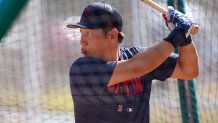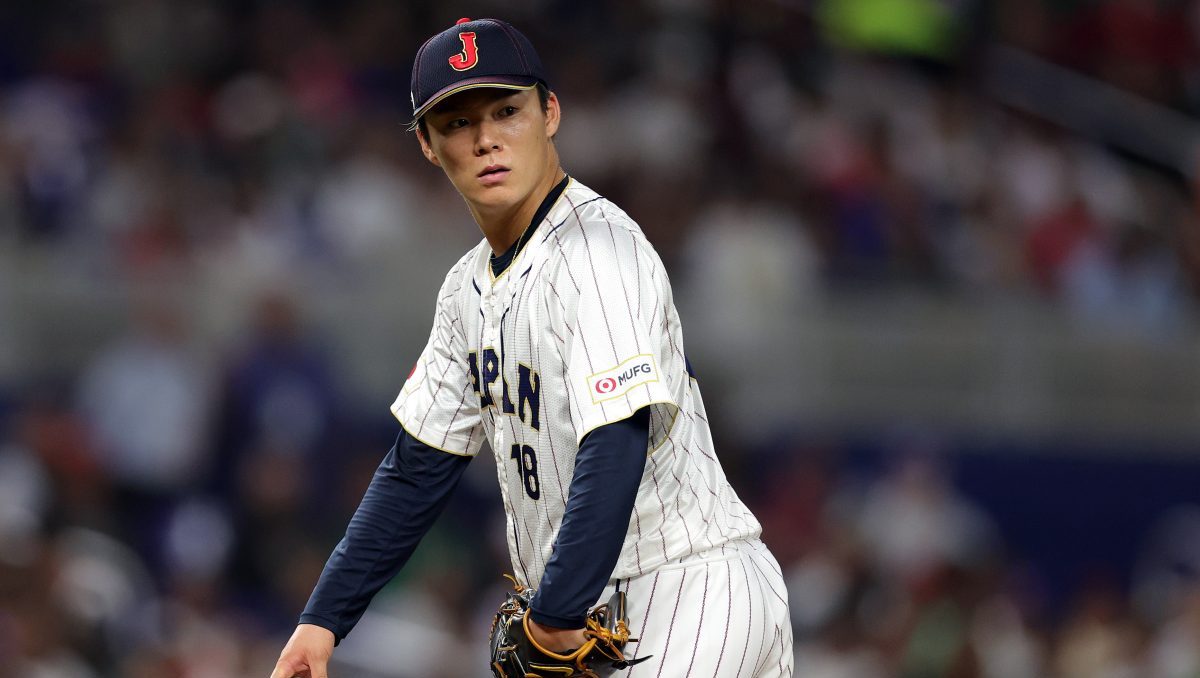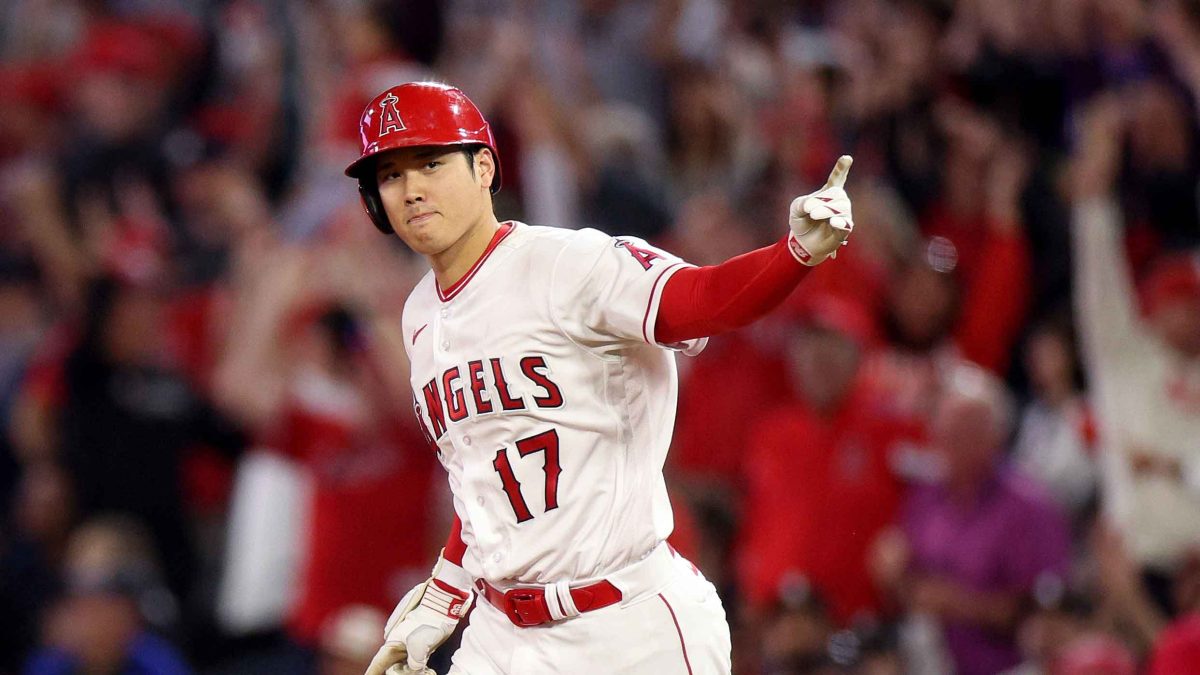Like the obsessed detective scrutinizing a corkboard webbed in pushpins and red string, I am finally seeing a path to Boston for free-agent ace Yoshinobu Yamamoto.
With precious little actual information to go on -- know Yamamoto was posted last week, will narrow the field via Zoom, and must sign by Jan. 4 -- we are instead left to connect the dots like an animated Brian Windhorst GIF, and it just so happens there's a path to Boston, if you squint just right.
From a key proclamation by Red Sox chairman Tom Werner, to a friendship Yamamoto shares, to the fate of his uniform No. 18, let's delve into the evidence and see if we can't steer the No. 1 starter on the market to Fenway Park.
Stay in the game with the latest updates on your beloved Boston sports teams! Sign up here for our All Access Daily newsletter.
1. An existential need
Four years of Chaim Bloom may or may not have restocked the farm system, but they definitely decimated interest in the team. With NESN's rating plunging and Yankees tickets selling for five bucks in September, Red Sox ownership belatedly recognizes the need to energize the masses.
Werner, speaking after Craig Breslow's introduction as chief baseball officer, did not mince words when asked how aggressive the club would be this offseason.
More Red Sox coverage
"We know that we have to be competitive next year," he said. "We're going to be competitive next year. We're going to have to be full throttle in every possible way."
Many took that to mean they'd pursue Shohei Ohtani, but his inability to pitch for at least a year, coupled with his age, injury history, and astronomical contract demands, never made him the best fit. A 25-year-old ace, on the other hand? That's a splash with potential staying power, even if it costs more than $200 million to get him.
2. An actual need
Give the Red Sox just one above-average starter last year, and they probably make the playoffs. Instead, they tried to get by with the husk of Corey Kluber, the false promise of Chris Sale, and a bunch of guys who probably should've been relievers. Youngster Brayan Bello kinda looked the part, at least until he ran out of gas.
The Red Sox cannot compete in the American League East without a legitimate No. 1 starter, and Yamamoto is widely considered the most talented arm on the market, with numbers in Japan (1.82 lifetime ERA) that surpass those of successful MLB countrymen like Daisuke Matsuzaka (don't laugh), Masahiro Tanaka, Yu Darvish, and last year's NL Rookie of the Year runner-up, Kodai Senga.
With a fastball that touched 97 mph in the World Baseball Classic, and a devastating slider-curve combo, Yamamoto is widely considered the real deal at an age (25) where he could spend the entirety of a six-year deal in his prime.
3. The changing game
Most of Yamamoto's measurables jump off the page, except one – his size. At 5-foot-10 and only 175 pounds, he's small by big-league standards, especially for a right-handed pitcher. But the old concerns about durability are mitigated by today's style of play.
Whereas an undersized right-hander like former Red Sox All-Star Tom Gordon eventually found himself moved to the bullpen because he couldn't withstand the rigors of throwing 200 innings annually, even the best pitchers in today's game barely average six innings a start. NL Cy Young Award winner Blake Snell, for instance, just threw 180 innings, and only five pitchers reached 200; a decade ago, 36 pitchers topped that mark.
That means Yamamoto won't be expected to go seven-plus innings. His workload will be managed, just like everyone else's in a reliever-dominated game, and that should equal increased longevity, no matter his size.
4. The Yoshida connection
Though an erroneous report last week briefly suggested that Yamamoto would prefer to play on a team with another Japanese player, his agent, Joel Wolfe, actually told reporters in Japan that Yamamoto would have no problem playing with one.
Either way, the Red Sox have a connection in Masataka Yoshida, who spent six years as Yamamoto's teammate on the Orix Buffaloes. Yoshida told the Boston Herald in September that the two are friends and remained in contact during the season.
There are worse drawing cards than a longtime teammate to ease the transition to the United States.

5. A Yankees crack?
At first glance, Yamamoto would appear to have nothing in common with Yankees slugger Giancarlo Stanton, but it turns out they share an agent, and he's not happy with Yankees general manager Brian Cashman.
That's because Cashman quite reasonably labeled Stanton injury prone at the GM meetings earlier this month, causing Wolfe to fire back, via Ken Rosenthal of the Athletic:
"I think it's a good reminder for all free agents considering signing in New York, both foreign and domestic, that to play for this team you've got to be made of Teflon, both mentally and physically because you can never let your guard down — even in the offseason."
The "both foreign and domestic" line is doing some heavy lifting there, and even if New York can still win the bidding for Yamamoto, his agent's words suggest there will be other issues at play.
6. The Breslow connection
Breslow has some experience in the Japanese market, thanks to Chicago's acquisition of Seiya Suzuki two years ago, when the Cubs outbid the Red Sox, among others, for the outfielder.
According to Andy Martino of SNY, Breslow is "said to be highly regarded" by Suzuki, which might not be much, but let's make it one more point in Boston's favor, because remember, we're connecting dots here.
7. What's in a number?
As it turns out, no one. The Yankees reportedly kept No. 18 out of circulation last year because they were reserving it for Yamamoto, who wears the traditional ace's number in Japan.
While Adam Duvall sported those digits in the outfield last year, Yamamoto's number isn't currently being worn by anyone, since Duvall is a free agent.
Both Matsuzaka and countryman Hirokazu Sawamura wore No. 18 with the Red Sox. Perhaps Yamamoto will make three?


